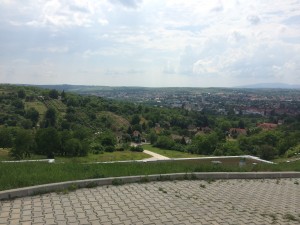For my STEP signature project, I decided to take part in the Global May Hungary program. During the program, I learned about and took classes in Budapest, Vienna, and Warsaw. For the class’s final project, we broke into small groups to make a short video about a topic of our choosing, which in our case was Hungarian wine.
I’ve never been someone with an excessive amount of confidence. I’ve lived in pretty much the same area my entire life, and so I never really needed to expand my boundaries. I always knew that if I wanted to get shampoo, I could grab some from the Kroger’s down the street or the Wallgreens on the corner. If I needed a snack I could run down to dairy queen, or if I wanted something more substantial I had my choice of Chipotle, Skyline, or Subway. My family was never more than a phone call away, and I’d had the same reliable group of friends since middle school. Even coming away to college didn’t change things much. I spent a day or two re-calibrating to my environment, and then I was set. I was comfortable in my well charted world, and most of my insecurities had prevented me from leaving it. Until studying abroad, I’d never realized how restricted I’d been.
When I arrived in Hungary, I was in a land that I’d never seen, and didn’t know how to interact with. None of my familiar landmarks were there — I doubted Hungary had even heard of Chipotle, my family and friends were all sound asleep as I was shielding my eyes from the afternoon sun, and even if I used my phone (which would have cost me $10 every day I did) I wouldn’t know how to even begin to look up where I was or wanted to go. I’d been told the names of some important places to go to if I got lost, but the Hungarian alphabet itself was so different from the English one that trying to type out anything was a formidable task. (They pronounce s as sh there. If you just want a normal s sound, you have to make it sz. How does that make sense?). Getting to the hostel was easy enough thanks to taxis provided by OSU, but after I got there, I had to contend with a problem I faced even in America: new people. My admittedly flawed strategy for meeting new people had always been to assume they’re scary and to sit and watch them suspiciously until either they proven otherwise or I could leave. Statistically speaking, I’m sure this had saved me from at least one serial killer, however, it did complicate the matter of making friends outside my current, well vetted circle. But I knew that unless I wanted to spend the entire month alone, I had to actually try and talk to people. At first, it was rough. I was certain I sounded awkward, whenever I talked about myself I was afraid I sounded weird or clueless, and during group activities I always felt like a 17th wheel. But around the second or third day, it got easier. By the end of the first week, it was as easy talking to some of the people on the group as it was talking to my oldest friends.
I began to realize that most of the insecurities that had held me back in America had really been unfounded. When I started a conversation with the mindset that the other person liked me, it was so much easier to talk than when I’d had the mindset that they vaguely resented me. Once this clicked for me, everything was so much easier. Beyond just bonding with the other people on the trip, getting around the city was so much simpler when I realized that I could simply ask people where things were. Even though English wasn’t necessarily their first language, most of the people I ran across could speak it well enough to give simple directions. Or, if all that failed, the Hungarian phrases I’d picked up could usually guide me on my way.
The ultimate challenge on the trip came at the end, when my video group planned a trip to a wine town called Eger to do some shooting for our project. Because it was out of the way compared to the metropolitan Budapest, it was a lot lest tourist friendly. Sidewalks weren’t a given, public transportation was hard to come by, and almost no one spoke English. But instead of allowing these challenges to discourage me, as I might have at the beginning of the trip, they excited me. By this point, it felt natural to me to slip into my rudimentary Hungarian and ask a local when my group was lost. When we went to the winery, it was easy for me to pipe up and ask the wine expert for clarification or to expand when I didn’t feel like he was quite clear or hadn’t gone into detail on something I felt was important. And as a result, I like to think that our project overall was better.

Because of STEP and Global May Hungary, I am a much more confident and outgoing person. Outside of the obvious mental health benefits, this has made school so much simpler. I don’t feel afraid to reach out for help when I’m struggling in class, and I don’t waste time agonizing over whether or not to raise my hand in class. I just ask my question, my professor answers it, and I get more out of the rest of the lecture because I’m focusing on what I do know as opposed to zeroing in on what I might have missed. Also, it has made looking for an internship substantially easier. I got a lot more positive responses during the career fair, and the interviews I’ve had since then have been night and day compared to the ones I had last year. Without the development opportunities that STEP gave me, I sincerely doubt that I would be in as good a position as I am to achieve my future goals.

